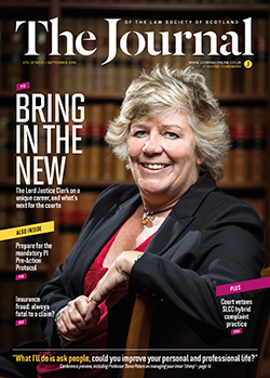Culling of the hybrids

On receipt of a complaint, one of the first steps that requires to be taken by the Scottish Legal Complaints Commission is to determine the nature of the complaint.
Section 2(1A) of the Legal Profession and Legal Aid (Scotland) Act 2007 provides that when the Commission receives a complaint, it must: “(a) determine whether the complaint constitutes– (i) a conduct complaint, (ii) a services complaint, and then (b) take the preliminary steps mentioned in subsection (4)”.
Section 2(2B) provides: “Where, for the purposes of subsection (1A)(a), it appears to the Commission that the complaint may constitute both– (a) a conduct complaint, and (b) a separate services complaint, it must consult, co-operate and liaise with the relevant professional organisation and have regard to any views expressed by the organisation on the matter before making a determination under subsection (1A)(a) as respects the complaint.”
For several years, the Commission has, in conducting this exercise, adopted the practice of categorising certain complaints as “hybrid” complaints, meaning that, in the Commission’s view, the complaints raise both a conduct issue and a question of inadequate professional services. Complaints raising conduct issues are investigated by the legal professional bodies. Complaints raising questions of inadequate professional service are investigated by the Commission. The result of a hybrid classification is therefore that the Commission and the professional body could separately investigate the same complaint and reach discrete (and potentially different) determinations.
The Bartos case
That is exactly what happened in Bartos v Scottish Legal Complaints Commission 2015 SC 690. Bartos concerned a complaint about an advocate to the effect that he had falsely stated during a hearing that it was his client’s wish that the case be dismissed, despite having no instructions to do so.
The Commission determined that the complaint raised both a conduct issue and a question of inadequate professional services. Both the Faculty and the Commission thereafter independently investigated whether Bartos had falsely stated to the court that his client wished the case to be dismissed. The Faculty, after investigation, found that Bartos had not misled the court, whereas the Commission, after a separate investigation, found that he had.
In the event, the court in Bartos did not require to come to a view on the competency of a classification of “hybridity” (the appeal was disposed of on other grounds), albeit it made certain provisional comments.
The Anderson Strathern case
In the recent case of Anderson Strathern LLP v Scottish Legal Complaints Commission [2016] CSIH 71 (31 August 2016), the issue was brought into sharp focus and the Inner House was specifically asked to rule on the question. The court concluded that the relevant provisions in the 2007 Act did not give the Commission power to categorise issues raised within a complaint as “hybrid”.
Lord Malcolm, delivering the opinion of the court, indicated that the practice of categorising complaints as “hybrid” was inconsistent with the parliamentary intention to limit the Commission’s decision-making jurisdiction to services complaints. When the Commission was established, it was given jurisdiction to adjudicate on complaints of inadequate professional services, with the Scottish Parliament deciding that complaints alleging misconduct should remain within the jurisdiction of the professional bodies, subject only to procedural oversight from the Commission.
Of concern to members of the profession also was the fact that the practice of categorising complaints as “hybrid” created a risk of “double jeopardy”, with solicitors risking the same issue being investigated twice by separate bodies. The potential for such an approach leading to unsatisfactory outcomes was clearly highlighted in Bartos.
Lord Malcolm advised: “In short, we are of the opinion that if a complaint, or part of a complaint, suggests a failure in proper professional conduct, a view taken by the Commission that it could also be seen as raising a services issue does not justify the course taken in Bartos. Instead, the Commission must decide whether to classify it as a conduct or a services complaint.”
The real mischief?
The Commission’s disappointment at the decision is, however, also understandable. Its chief executive has pointed out that the categorisation of complaints as conduct, service or hybrid is important to clients of the profession.
Indeed, the Commission has the ability to award £20,000 in compensation – whereas the professional bodies can only award compensation of up to £5,000 but can also, in extreme cases, expel the practitioner from the professional body. This potentially creates a tension between the interests of a complainant (who is likely to be focused on redress for the particular wrong suffered), and the general public interest in seeing misconduct appropriately identified and dealt with (through the expulsion of the practitioner if necessary).
As Lord Malcolm observed: “The real mischief, which may need addressing, is the disparity between the compensation powers available to, on the one hand the professional organisations, and, on the other hand, to the Commission.”
The Scottish Government was elected on a manifesto commitment to launch a consultation on the regulation of the legal profession in Scotland. Hopefully that mischief will be addressed.
Risk of appeals?
In the meantime, it remains to be seen what will come of existing findings based on hybrid classifications of complaints. Section 21 of the 2007 Act allows for appeals against decisions of the Commission on the ground (inter alia) that the Commission’s decision was based on an error of law.
Where one of the professional bodies has carried out an investigation and reached a conclusion in relation to a particular issue, and the Commission has thereafter carried out a separate investigation relative to the same issue, it would seem that any decision reached by the Commission on the basis of that separate investigation must be at risk of challenge under s 21.
In terms of s 21, appeals must be brought within 28 days of the decision. The court does, however, have the ability to consider an appeal after the expiry of that deadline, on cause shown. It remains to be seen whether this decision would present adequate cause.
Further comment
Neil Stevenson, SLCC chief executive: “This decision could have a huge impact on our process and, unfortunately, our ability to provide swift redress to those who bring a valid complaint... Once the judgment has been fully considered, we will communicate with the profession and public further about current cases. We have been calling for some time for a simplification of the ‘customer journey’ in legal complaints, recently through publishing our Reimagine Regulation paper, and believe this only serves to increase the urgency of legislative change.”
Carol Brennan, chair of the SLCC consumer panel: “The suggestion put forward by counsel for the appellants that complainers who enter the conduct complaint route, which affords significantly lower levels of compensation, still retain the right to pursue damages in court proceedings, appears to counter the very rationale for the SLCC’s creation.”
Lorna Jack, chief executive of the Law Society of Scotland: “We have always agreed that the service provided by a firm and the individual conduct of a solicitor represent distinct issues even though they can arise from the same set of circumstances. We were happy to support the SLCC in its arguments during its appeal. However, we now need to respect this judgment which creates some key challenges for how the SLCC assesses and then handles hybrid complaints. We will work with the Commission and the Faculty of Advocates so the appropriate changes are made and to ensure conduct issues are passed to the relevant professional body for investigation as swiftly as possible.”
In this issue
- Beyond the named person service
- Sexual harassment: an everyday problem
- Governing Scotland in a federal United Kingdom
- Losing our judgment? (1)
- Reading for pleasure
- Opinion: Alison Reid
- Book reviews
- Profile
- President's column
- The future, step by step
- People on the move
- Changing face of the courts
- Success: the chimp factor
- Courts reform: a call to pre-action
- Teeth that could be sharper
- Good claims, bad lies
- Unlocking doors: demystifying squatting
- Back to basics
- Brexit and IP: what should solicitors be doing now?
- Agency, insolvency and termination
- Brexit and the agricultural sector
- A carnival for some, but not for others
- Scottish Solicitors' Discipline Tribunal
- Culling of the hybrids
- Common property: what policy?
- Cause of action
- Client balances: reminder issued
- Law reform roundup
- From the Brussels office
- Paralegal pointers
- Your Law Society of Scotland Council Members
- At the doors of the court
- Ask Ash
- To the focused, the medals
- Losing our judgment?
- MacKenzie boosts Society's AML drive






